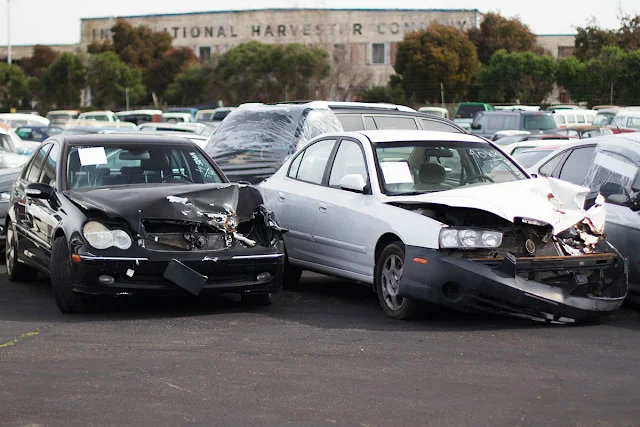Ad Code
Translate
Smart strategies for trading on crypto exchanges
October 20, 2025
Five Do’s For a Healthy Turnover That Bolsters Talent-Retention
October 20, 2025
Discover Honeybee Pharmacy (2025 Guide Important Consumer Tips)
October 14, 2025
What is Ozempic (semaglutide)? (Updated in 2025)
January 30, 2025
Posture Bra: Improving Back Support and Comfort
October 20, 2025
How To Find Suitable Properties In Cyprus?
October 20, 2025
10 Effective Strategies to Improve Domain Authority of Your Website
October 20, 2025
Are Salvage Cars Worth the Money?
Khabza Mkhize
August 30, 2019
A car is considered totaled when the cost of repairs is greater than the value of the car. When totalled cars are repaired, they’re branded with a salvage title. Although salvage titles let prospective buyers know that cars have a significant history, the title doesn’t necessarily mean that the car isn’t worth buying. In fact, putting in the work of finding and fixing a salvage car can ultimately help you save money off the sticker price of a regular car.
If you’re in the market for a salvage car, here are some factors to consider to determine whether the purchase is really worth the money.
Learn the car’s history
Typically, vehicles are branded with a salvage title when they’re involved in a crash. However, some states list vehicles that have experienced fire or flood damage as salvaged. For cars that have experienced fire or flood damage, it can be difficult to determine what needs to be done to repair these cars and return them to a reliable, working condition. As a result, prospective buyers should approach these cars with caution.On the same note, crash damage can vary significantly from vehicle to vehicle. If you’re looking to save money on repairs, it’s best to stick to body damage or damage to the working parts of the vehicle. Auto experts recommend steering clear of bent frames, which can compromise the safety of a vehicle even after the proper repairs have been completed.
Consider the purchase details
To determine whether a salvage car is worth buying, you’ll need to consider purchase details, including the insurance, warranty, and registration. Because insurance for salvage cars varies depending on the state and insurance company, make sure to ensure you’re getting liability insurance for the vehicle.When it comes to the warranty, ask your dealer whether a warranty is offered. In most cases, dealers will decline to offer a warranty on a salvaged vehicle.
The registration process for salvage cars also varies depending on the state. In certain states, police officers are required to inspect salvage cars before they can be registered and driven. In other states, a repair shop certification must be obtained before the car can be registered. If you’re not sure what the guidelines are for your state, check with your DMV.
Do the math
Insurance companies brand vehicles with salvage titles because the cost of repairs is greater than the value of the vehicle. Therefore, it’s crucial to take the overall value of the vehicle and the cost of repairs into consideration before purchasing any salvage vehicle. For instance, if a new $30,000 car is considered salvaged, you won’t want to spend that kind of money to bring the car back to a reliable condition. On the other hand, if you find a car with a value of $6,000, the car might be worth repairing. Generally, it’s best to stick to older cars when buying a salvage vehicle.Comparing the car’s overall value with the cost of repairs can help give you an idea of whether the car is worth it. If you find a salvage dealer advertising minimal damage on a newer or more expensive model, trust your senses. If it seems too good to be true, it probably is.
Ultimately, anyone looking for salvage cars for sale should search for a reliable and trustworthy dealer. If you’re in the market for a salvage car, but not sure where to start, the best dealers can help you score a great salvage car at a low price without the hassle of bidding or waiting.
Featured Post
DL Mining Launches Ethereum Contract Participation Service, Helping Users Earn $2K Stable Daily Returns
Zizo Gala-Mkhize-
October 20, 2025
Soapie Teasers
Sister Sites
Most Popular
List of 6,000+ Dofollow Commentluv Blogs FREE (Updated 2025)
January 16, 2025
Five Do’s For a Healthy Turnover That Bolsters Talent-Retention
October 20, 2025
How To Choose The Right Place For A Winter Campsite
March 06, 2023
Popular posts
List of 6,000+ Dofollow Commentluv Blogs FREE (Updated 2025)
January 16, 2025
Five Do’s For a Healthy Turnover That Bolsters Talent-Retention
October 20, 2025
How To Choose The Right Place For A Winter Campsite
March 06, 2023
Footer Menu Widget
Created By Blogspot Theme | Distributed By Gooyaabi Templates


Social Plugin